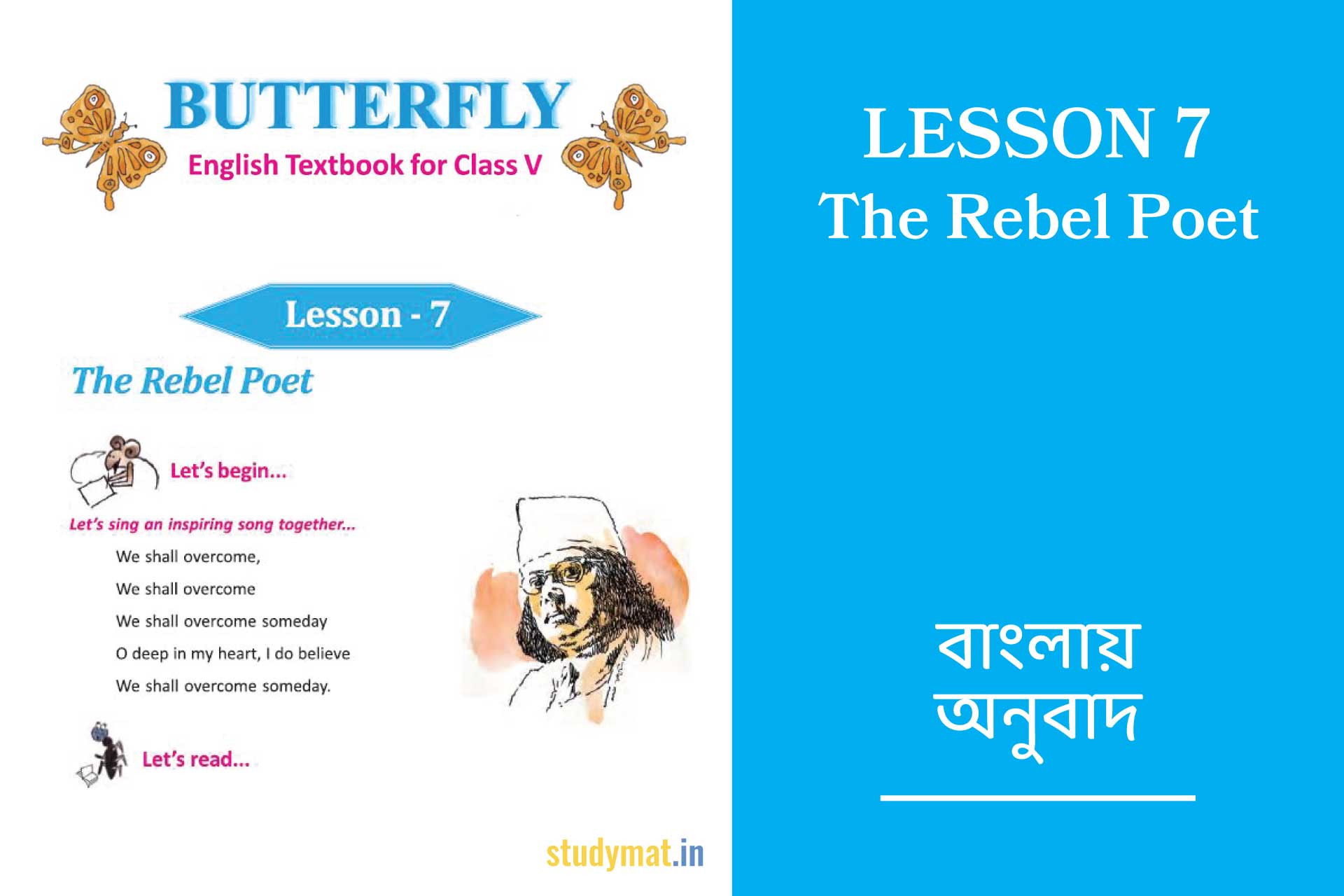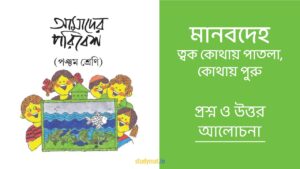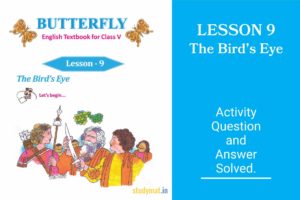“Butterfly” is the English textbook for class 5 approved by the West Bengal Board of Primary Education (WBBPE). You are in the right place if you are looking for Lesson 7, The Rebel Poet – Bengali Translation line by line.
THE REBEL POET – BENGALI TRANSLATION | বাংলায় অনুবাদ
[Pritam is a student of class V. He returns home from school, all excited. He finds his father reading a newspaper.]
[প্রীতম পঞ্চম শ্রেণির ছাত্র । সে স্কুল থেকে বাড়ি ফিরে, উত্তেজিত । সে তার বাবাকে একটি সংবাদপত্র পড়তে দেখল ।]
Pritam: Father, guess what happened today?
প্রীতম: বাবা, আজকে কি হয়েছে অনুমান কর তো ?
Father: What, dear?
পিতা: কি ? (আদরের সঙ্গে)
Pritam: Our teacher has asked us to sing a patriotic song on the Republic Day.
প্রীতম: আমাদের শিক্ষক প্রজাতন্ত্র দিবসে একটি দেশাত্মবোধক গান গাইতে বলেছেন ।
Father: Which song are you going to sing, son?
বাবা: তুমি কোন গানটি গাইতে যাচ্ছ ?
Read Also:
Revision Lesson – Bengali Translation | Class 5 | Butterfly
India : Superpower in Cricket | Lesson 1 | Bengali Translation | Class 5 | Butterfly
Pritam: Ma’am suggested that we should sing ‘Karar oi louha kopať.
প্রীতম: ম্যাম পরামর্শ দিলেন যে আমাদের ‘কারার ওই লৌহ কপাট’ গাওয়া উচিত ।
Father: Do you know who has written the song, Pritam?
পিতা: তুমি কী জান গানটি কে লিখেছেন, প্রীতম ?
Pritam: No, father.
প্রীতম: না, বাবা ।
Father: He is our great poet, Kazi Nazrul Islam, the author of the famous poem, ‘Bidrohi’.
পিতা: তিনি হলেন আমাদের মহান কবি, কাজী নজরুল ইসলাম, বিখ্যাত কবিতা ‘বিদ্রোহি’ এর রচয়িতা ।
Pritam: Will you tell me more about him?
প্রীতম: তুমি কি তাঁর সম্পর্কে আমাকে আরও কিছু বলবে ?
Read Also:
A Feat on Feet | Lesson 2 | Bengali Translation | Class 5 | Butterfly
Phulmani’s India | Lesson 3 | Bengali Translation | Class 5 | Butterfly
Father: He was born at a time when India was under the British rule. Through his writings, he inspired the Indian youth to boldly fight for freedom.
পিতা: তিনি এমন এক সময়ে জন্মগ্রহণ করেছিলেন যখন ভারত ব্রিটিশ শাসনের অধীনে ছিল । তাঁর লেখার মাধ্যমে তিনি ভারতীয় তরুণদের সাহসিকতার সাথে স্বাধীনতার জন্য লড়াই করতে উদ্বুদ্ধ করেছিলেন ।
Pritam: When was he born, father?
প্রীতম: তিনি কবে জন্মগ্রহণ করেছিলেন, বাবা ?
Father: He was born on 24th May, 1899 in the village of Churulia. This was near Asansol in the Burdwan district of undivided Bengal. As a child he was attracted to folk theatre and later wrote many folk plays like ‘Daata Karna’ and ‘Kabi Kalidas’.
পিতা: তিনি ১৮৯৯ সালের ২৪শে মে চুরুলিয়া গ্রামে জন্মগ্রহণ করেছিলেন । এটি অবিভক্ত বাংলার বর্ধমান জেলার আসানসোলের কাছে অবস্থিত ছিল । শৈশবে তিনি লোকনাট্যের প্রতি আকৃষ্ট হন এবং পরবর্তীকালে ‘দাতা কর্ণ’ এবং ‘কবি কালিদাস’ এর মতো বহু লোকনাট্য রচনা করেন ।
Pritam: That is interesting!
প্রীতম: এটা মজার !
Read Also:
Memory in Marble | Lesson 4 | Bengali Translation | Class 5 | Butterfly
My School Days | Lesson 5 | Bengali Translation | Class 5 | Butterfly
Father: In 1910, Nazrul met the revolutionary Nibaran Chandra Ghatak, who was his teacher. The poet Kumud Ranjan Mullick was the Head Master of the school Nazrul joined next.
পিতা: ১৯১০ সালে, নজরুল বিপ্লবী নিবারণ চন্দ্র ঘটকের সাথে দেখা করেন, যিনি তাঁর শিক্ষক ছিলেন । কবি কুমুদ রঞ্জন মল্লিক ছিলেন বিদ্যালয়ের প্রধান শিক্ষক, নজরুল পরবর্তীতে যোগ দেন ।
[Uncle Rahim enters the room. He joins in the conversation.]
[কাকু রহিম ঘরে প্রবেশ করলেন । তিনি কথোপকথনে যোগ দিলেন ।]
Pritam: Did Kumud Ranjan inspire him to write poems?
প্রীতম: কুমুদ রঞ্জন কি তাকে কবিতা লিখতে অনুপ্রাণিত করেছিলেন ?
Father: Yes. But Nazrul was also influenced by Rabindranath and the Persian poets like Hafez and Khaiyyam.
পিতা: হ্যাঁ । কিন্তু নজরুল রবীন্দ্রনাথ এবং হাফেজ ও খৈয়ামের মতো পারস্য কবিদের দ্বারাও প্রভাবিত ছিলেন ।
Read Also:
The Clever Monkey | Lesson 6 | Bengali Translation | Class 5 | Butterfly
The Rebel Poet | Lesson 7 | Question & Answer | Class 5 | Butterfly
Uncle Rahim: Did you know that Nazrul joined the army under the British? He was in the 49th Bengal Regiment. After the first World War, the regiment was disbanded in 1920. So he came to Calcutta.
কাকু রহিম: তুমি কি জানো যে নজরুল ব্রিটিশদের অধীনে সেনাবাহিনীতে যোগ দিয়েছিলেন ? তিনি ৪৯তম বেঙ্গল রেজিমেন্টে ছিলেন । প্রথম বিশ্বযুদ্ধের পরে, ১৯২০ সালে রেজিমেন্টটি ভেঙে দেওয়া হয়েছিল । তাই তিনি কলকাতায় আসেন ।
Father: At that time Indians had risen against the British rule. Nazrul protested against the cruelty of the British in his own way. In fact, he also started writing poems, essays and songs to voice his protest. He is the rebel poet of India.
পিতা: সেই সময় ভারতীয়রা ব্রিটিশ শাসনের বিরুদ্ধে জেগে উঠেছিল । নজরুল তাঁর নিজের মতো করে ব্রিটিশদের নিষ্ঠুরতার বিরুদ্ধে প্রতিবাদ করেছিলেন । প্রকৃতপক্ষে, তিনি তাঁর প্রতিবাদ জানাতে কবিতা, প্রবন্ধ এবং গান লিখতে শুরু করেছিলেন । তিনি ভারতের বিদ্রোহী কবি ।
Pritam: I hardly knew as much!
প্রীতম: আমি খুব কমই জানতাম !
Read Also:
Buildings to Remember | Lesson 8 | Bengali Translation | Class 5 | Butterfly
The Bird’s Eye | Lesson 9 | Bengali Translation | Class 5 | Butterfly
Father: You should read his poems like ‘Kandari Hunsiar’,’Kheya Parer Tarani’, and also listen to his songs. The British were afraid that Nazrul’s writings could instigate the Indian freedom fighters.
পিতা: তোমার তাঁর ‘কান্ডারী হুঁশিয়ার’, ‘খেয়া পারের তরণী’র মতো কবিতা পড়া উচিত, এবং তাঁর গানগুলিও শোনা উচিত । ব্রিটিশরা ভীত হয়েছিল যে নজরুলের লেখা ভারতীয় মুক্তিযোদ্ধাদের উস্কে করতে পারে ।
Pritam: What did the British do?
প্রীতম: ব্রিটিশরা কী করেছিল ?
Uncle Rahim: The British grew perturbed.
কাকু রহিম: ব্রিটিশরা বিচলিত হয়ে পড়েছিল ।
Father: In 1922, Nazrul started a magazine ‘Dhumketu’ where he published ‘Anandamoyeer Agamone’, a poem.
পিতা: ১৯২২ সালে, নজরুল ‘ধূমকেতু’ নামে একটি পত্রিকা শুরু করেছিলেন যেখানে তিনি ‘আনন্দময়ীর আগমন’ নামে একটি কবিতা প্রকাশ করেছিলেন ।
Read Also:
A Great Social Reformer | Lesson 10 | Bengali Translation | Class 5 | Butterfly
The Finishing Point | Lesson 11 | Bengali Translation | Class 5 | Butterfly
Uncle Rahim: The British raided the office of ‘Dhumketu’. The poet was arrested from Kumilla.
কাকু রহিম: ব্রিটিশরা ‘ধূমকেতু’র অফিসে হানা দিয়েছিল । কবিকে কুমিল্লা থেকে গ্রেফতার করা হয়েছিল ।
Pritam: What happened then?
প্রীতম: তারপরে কি ঘটলো ?
Father: He was transferred to the Hooghly Jail and there he began fasting. It was his way of protesting against the torture of the British.
পিতা: তাকে হুগলি কারাগারে স্থানান্তর করা হয় এবং সেখানে তিনি অনশন শুরু করেছিলেন । এটি ছিল ব্রিটিশদের অত্যাচারের বিরুদ্ধে প্রতিবাদ করার তাঁর পদ্ধতি ।
Pritam: For how many days did he fast, father?
প্রীতম: তিনি কত দিন অনশন রেখেছিলেন, বাবা ?
Read Also:
Beyond Barriers | Lesson 12 | Bengali Translation | Class 5 | Butterfly
Father: He fasted for more than a month. In December 1923, he was released from jail.
পিতা: তিনি এক মাসেরও বেশি সময় ধরে অনশন রেখেছিলেন । ১৯৩৩ সালের ডিসেম্বর মাসে তিনি কারাগার থেকে মুক্তি পান ।
Pritam: Thank you so much, father! Now I’ll be able to sing ‘Karar oi louha kapat’ with zeal and passion. I’m so proud that the teacher has selected me for singing.
প্রীতম: তোমাকে অনেক ধন্যবাদ, বাবা ! এখন আমি উদ্যম ও আবেগের সাথে ‘কারার ঐ লৌহ কপাট’ গাইতে পারব । আমি খুবই গর্বিত যে শিক্ষক মহাশয় আমাকে গান গাওয়ার জন্য নির্বাচিত করেছেন ।
Uncle Rahim: Then let’s hear you sing. We’ll sing along with you as well.
কাকু রহিম: তাহলে আমরা তোমার গান শুনি । আমরাও তোমার সাথে গান গাইব ।
So, hope you have found, Lesson 7, The Rebel Poet – Bengali Translation line by line helpful.
Follow us:
If you like this article, you can Follow us on Facebook.
Also, you can Subscribe to our YouTube Channel.




Your writing style is engaging and informative. You’ve made the topic interesting and enjoyable to read about.
Thank you for the compliment, Ajay Kumar. I’m here to help and inform. I’m glad you found it interesting.